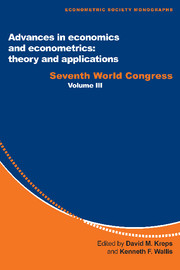Book contents
- Frontmatter
- 1 Causal analysis and statistical inference on possibly non-stationary time series
- 2 Cointegration, long-run comovements, and long-horizon forecasting
- 3 Testing and measurement in competition models
- 4 Empirical equilibrium search models
- 5 Posterior simulators in econometrics
- 6 Restricted least squares subject to monotonicity and concavity constraints
- 7 Bootstrap methods in econometrics: theory and numerical performance
- 8 Econometric models of option pricing errors
- 9 New minimum chi-square methods in empirical
- Index
3 - Testing and measurement in competition models
Published online by Cambridge University Press: 05 January 2013
- Frontmatter
- 1 Causal analysis and statistical inference on possibly non-stationary time series
- 2 Cointegration, long-run comovements, and long-horizon forecasting
- 3 Testing and measurement in competition models
- 4 Empirical equilibrium search models
- 5 Posterior simulators in econometrics
- 6 Restricted least squares subject to monotonicity and concavity constraints
- 7 Bootstrap methods in econometrics: theory and numerical performance
- 8 Econometric models of option pricing errors
- 9 New minimum chi-square methods in empirical
- Index
Summary
What is market power? Where is it found in late twentieth century markets? Has increasing internationalization destroyed it? What mechanisms support firms' attempts to build market-power positions for themselves? What are its proximate causes? What are its deep causes? These are some of the questions on which economic theory has made the most rapid progress in the last two decades. In sharp contrast to the situation beforehand, we now understand at a deep level when to expect price to exceed marginal cost. Significant advances in the theory of imperfectly competitive supply tell us under what circumstances an industry will sell less than the perfectly competitive quantity at more than the perfectly competitive price. Perhaps more importantly, formal theories of imperfect competition, overwhelmingly based in the game theory, offer precise and therefore testable characterizations of the behavior supporting the non-competitive outcomes. This short-run supply theory is necessarily incomplete. It takes as given the degree to which firms' products within an industry are substitutes, the degree to which firms' cost circumstances are similar, the information structures under which prices and/or quantities are set, the number of firms competing, and so on. Theories of the determination of all these objects have been another area of very rapid progress.
- Type
- Chapter
- Information
- Advances in Economics and Econometrics: Theory and ApplicationsSeventh World Congress, pp. 61 - 81Publisher: Cambridge University PressPrint publication year: 1997
- 4
- Cited by

